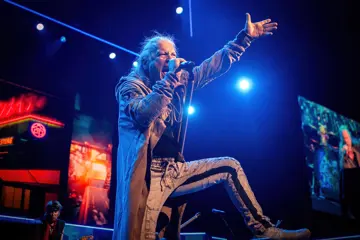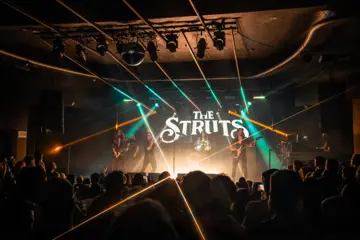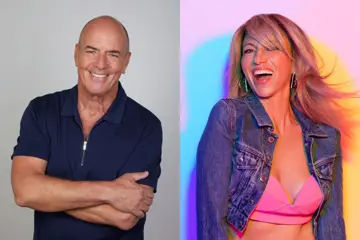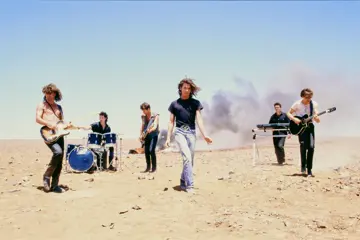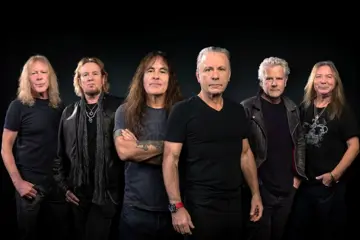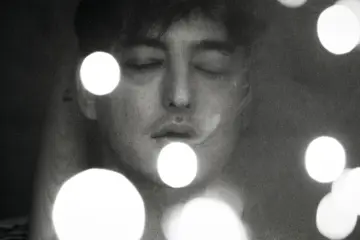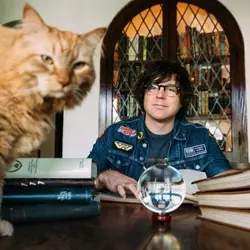 Ryan Adams
Ryan AdamsUS songsmith Ryan Adams has always poured his heart and soul into his art, and while he’s often visited terrains rife with despondency and self-realisation, few of his albums have been as beautifully desolate as his recent sixteenth long-player, Prisoner.
Conceived and penned during the fallout of his all too public divorce from wife of six years Mandy Moore, Prisoner’s songs once more take difficult personal experiences and mould them into art in Adams’ inimitable fashion.
When The Music catches up with Adams he’s in Washington DC on a rest day during his North American tour, and he happily attests that he’s stoked with the results of Prisoner now that he’s had the chance to test them all out in the live realms.
“I mean I was happy with it the day I met those songs, the day that they happened they’re part of me,” he reflects. “So yeah, I love it. In fact it plays live so well, it’s probably my favourite… I mean I always make something that’s my favourite thing, but this is a really, really powerful record and it’s really powerful live. It just keeps giving back.”
"How many people fall in love because a perfect moment happens and just at that perfect moment while they’re looking at each other and realising that they’re not just friends, just a wonderful piece of music comes on that says something?"
Don't miss a beat with our FREE daily newsletter
Incredibly he’s just made public online another 17 strong tracks from the Prisoner sessions — soon to be released in physical form as part of the Prisoner: End Of The World boxset — and he tells that even this new treasure trove is merely the top of the iceberg.
“There’s actually 70 masters, so that’s probably 29 or 30 of them out there so far,” he tells. “So there’s already a whole other Prisoner 2 and Prisoner 3 that people haven’t heard. But yeah, when I sit down to write though I don’t fuck around. I pretty much am ready to do it.”
Did the depth of the song pool make it difficult to select the final sequence for the album proper?
“No, not at all,” Adams explains. “You just sit down and you do it. I mean I’ve been doing it for a while, there’s always going to be more songs than I can get out on a single record, but you just look for content and you look for the way that it all matches up and then you go from there.
“Everyone that does this is different. If you ask an author how they construct chapters to make the flow of a book and get you to the last chapter so you feel that you’ve arrived at an epiphany, they would have a different construct than I do. My construct is just different than other people’s. And it also depends on the weight of the material and how emotionally heavy it is, and how it feels. Whereas in this instance the way that this record actually feels and is laid out I guess the best description would be that I couldn’t imagine it being laid out in a different way. It just sort of is what it is."
Ever since his earliest forays as frontman of alt-country outfit Whiskeytown in the ‘90s Adams has been a very personal songwriter — consistently pouring his self and his life experiences into his songs — but, unsurprisingly given the difficult circumstances of its genesis, Prisoner seems even sensitive in tone than usual.
“I mean don’t you think it would be much more interesting if you had to say to me ‘So Ryan, this record is about UFOs, that seems really weird given that your records are usually about human interaction and affairs of the heart’,” he chuckles softly. “Whereas in this instance it’s… you know, this is what I do, I write about the human condition, I write about who I am and about who people are and who we are when we’re in our hardest time. That’s just who I am. It’s just what I do. I dunno how to do anything else when I write that feels correct with the music.
“Rock’n’roll always seems like it was meant to stir something up in a person. Since I was a kid that’s always what I thought it was meant to be, so I always sort of write and play from that same place, where I don’t peddle bullshit at the market of rock’n’roll, I only bring my finest goods.”
Is this creative process something that he tangibly enjoys even when trying to make sense of less than ideal personal circumstances?
“Yeah, I wouldn’t do it if I didn’t want to do it, you know?” he posits without hesitation. “I don’t know if you’ve heard much about my personality but it’s pretty alpha, so I’m dedicated to what I do but I would be doing this whether or not people were going to hear it or not. It doesn’t make it a diary, but it certainly means that it means something to me that I maybe don’t even fully understand.
“I always imagined that the book On The Road by Jack Kerouac would have existed whether he had lived that life to then become the author of it that he would later, and also like a harbinger of an almost entire new species of writer. Guys like Henry Miller or Bukowski or Hunter S Thompson or any of the writers that we later could sort of see in a spectrum of confessional long-form narrative prose writers.
“But Elvis wasn’t necessarily telling you about his day-to-day life — or about the things that could or might fall apart in a life — he was there to excite you. It was later on when we get people like The Smiths or something that kind of incorporate that excitement or that nostalgia and that sense with this purpose that you can later combine the excitement of rock’n’roll with the confessional day-to-day kind of almost overtly romantic and slightly warped sense of self.
“I mean those things took a minute. Even Bruce Springsteen for that matter could be in that same category, and I think I’m very lucky that I grew up able to sort of have those direct things — those direct people who had become those kind of writers — be my direct guides.
"I don’t know if you’ve heard much about my personality but it’s pretty alpha..."
“So I don’t know to be any different. I love reading a trashy novel and I love a good pop song and I like the idea of a world of unfussiness, but for me the pen is very black and the ink runs deep and it runs at night and it’s just who I am. It’s just how I write and it’s just who I am.
“And I suppose that that’s how a writer and a human are balanced, by what part of their psyche engages in that kind of thing. What part of them does that in order to balance them, to be a goofball and a nerd. So my pen is dark and it draws a lot of blood but the irony is that I’m the biggest dork you would have ever met in your life, I really am, and I think that that’s the balance."
So when he’s on tour and revisiting these songs night after night is he actually reinhabiting those emotions each time or just playing them by rote?
“Yes, my songs work because I mean them — that’s why they work,” he reflects. “That’s an interesting thing, but I don’t have to try and mean them — I wrote them. I don’t know how not to mean them. It’s not exhausting to mean something: if it meant enough for you write it down it just is what it is. Those are truths to me in a way that they would not be to other people.
“The interesting thing is that those same things that I’m singing about mean something entirely different to someone else that I’ll never meet, and I find that to be very interesting. That’s the beauty of rock’n’roll.”
Adams explains that when he’s penning a new song there’s no rhyme or reason to how it comes to him from the ether, that it’s a different process every time depending on the track in question.
”There really isn’t a specific format,” he states. “There are songs that I dreamt from beginning to end that I play, that are on records. There are songs that I never thought I would finish; they were just riffs that were hanging around and then one day they completely made sense. There are songs that I just started humming along and playing guitar and they were born.
“But they’re all born out of necessity, at some point my psyche — whether it be something on my mind or something deep in my mind — it pushes something out that I need to make. But I’ve never sat around and had to work, had to break my back to want to make myself want to create a song. I think that something like writing songs is maybe a bit like if you’re someone who works with glass – you only have to break a few things before you realise that it’s not for you. I mean it’s a fragile thing. They’re songs and if they’re not going to work they’re not going to work, they’re not going to speak to you or to others.
“But for me since I write off the guitar — I write on the page mostly — so I think that the fact that that happens, there’s a door there, there’s some portal for me that makes sense for who I am and how it works. And I’ve kind of held steadfast to it for a long time, because I don’t really make music that has anything to do with a trend or a time. I don’t think my music could ever really be part of any one kind of a thing — that’s been the problem, I love songs. I like talking to people in a song, I like being in a song and I like correlating my feelings in a song.
"I love reading a trashy novel and I love a good pop song and I like the idea of a world of unfussiness, but for me the pen is very black and the ink runs deep."
“And I’ve learned a lot about life in songs. I think if anything honestly in modern contemporary culture has ever been so grossly overlooked, undermanaged and treated with such lack of respect, it’s songs. Because how many people that we both know — or will ever know — will ever learn about some of the ideas of how to help themselves in the moment where they feel their heart break for the first time — they’re not reading Shakespeare, they’re listening to a song.
“Or the first time they have a crush and they feel wild and out of control about it: they’re not standing in front of a painting at the Met Gallery — I mean they might be — but they’re probably listening to a song, a song is probably their friend. How many children are conceived by the blue light of a dashboard by some lovely couple out at midnight parked some place, or listening to some crazy record that they both love?
“And how many people fall in love because a perfect moment happens and just at that perfect moment while they’re looking at each other and realising that they’re not just friends, just a wonderful piece of music comes on that says something. Maybe it’s The Flamingos’ I Only Have Eyes For You which plays at that very moment and they talk about it when they’re 80: ‘Do you remember when that song came on and you first looked at me in that funny way and I knew?’ Songs are these very powerful and very magical things, they’re extremely important, and I think that they are banner moments of humanity. They’re ineffable and immovable and I think that they say everything about who we are, and they have to do it in three-and-a-half to five minutes or you’re going to bore the hell out of someone.”
It must feel good then when fans inevitably tell Adams tales of forging such connections with his music as a soundtrack: surely a lot have babies have been conceived to a work like [his 2000 solo debut] Heartbreaker?
“It’s unusual only in that I have a different relationship to those songs,” he chuckles. “It’s like listening to somebody having a reaction to something that I remember making — it’s awesome and I love it, but it’s also surreal because I’m just a guy who made it.
“If everybody’s over at my place for dinner, right — and my records are dinner — then I’ve been in the kitchen a little while and that vegan lasagne ain’t no mystery to me. I chopped up all those mushrooms and got ‘em in there, but you guys are just having the experience and that’s what’s great. That’s what’s great about being the guy that writes the songs, that makes the record, that goes out and does what they do — as a producer I would say, and maybe it’s the wrong way to put it, but I would say that that record is for everyone but me. I made it and it is me — I am in that record, and it is born of necessity and it is born completely from things that I needed to say and is genuine in every complete way — but it’s not a mirror, it really isn’t. It’s meant to come out of the kitchen and be for others. It’s meant to nourish other people.
“And the best thing you can do — for me and the feelings and the crazy things that have gone on in my life — is to take some of the more twisted parts of a life and turn them into something possibly beautiful for other people to grow from or learn from or experience them in a way that makes them want to love life more.
“That’s the best that I could ever hope. It’s like you take that bitter seed and you plant it and you grow something good with it, as opposed to eating it and getting sick. That’s how I see this stuff: I see it as my way of experiencing these things in a new way again, and as cheesy as it sounds I’ve always just been a true believer in the art of rock’n’roll since I was very young, and I suppose I always will be. It will always be my narrow street.”
What about when Adams is touring and presenting these songs in the live realm, when he has that special moment of connection with an audience is that important to him too?
“I mean even more so,” he offers. “I think more than anything the live format part of this is probably the most important. I mean the live set-up that we have now and the way I’m doing it, it gives me about 25 songs a night pretty much to get up and go from one side of my catalogue to the other — there’s never been a time where that hasn’t felt really urgent to me.
“Lately if anything I kind of feel like if anything the set-lists and the fact that I’m running through 16 different records and we’re doing so many people and there’s so much of a stage set-up but it’s still kind of loose, I think I feel more like myself onstage — more like a songwriter and more like a guitar player — than I ever have.
“And I’ve lucked into such a great band, and it’s such a great crew. It will be a brand new and finally a very redemptive feeling to bring an actual tour down to Australia where I actually have the production that I’m used to here [in the States], where I’m finally bringing what it’s like to experience an entire show here for me. That’s what I think I’m looking forward to the most."



